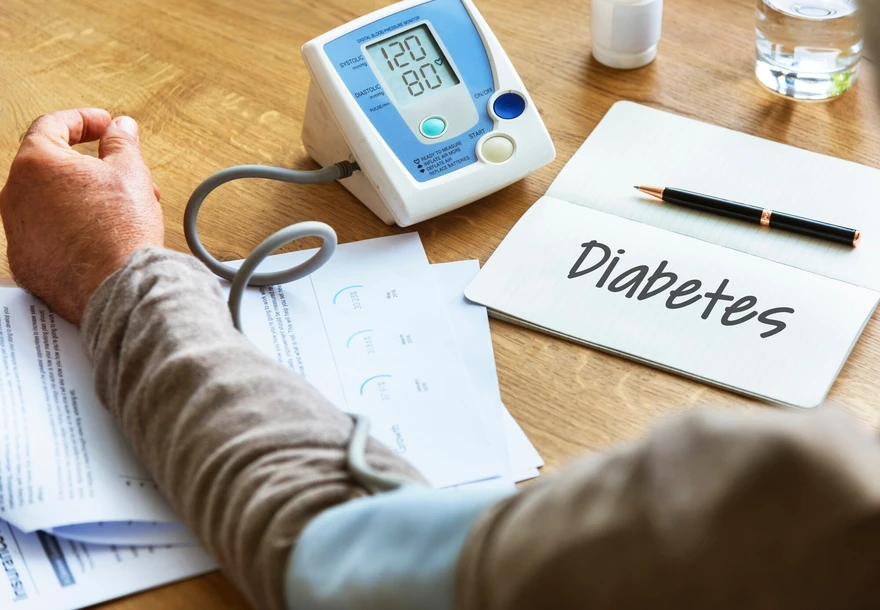Preventive Healthcare
Diabetic Ketoacidosis: Causes, Symptoms, and Treatment
953 Views
0

What is diabetic ketoacidosis?
Diabetic ketoacidosis (DKA) is a potentially life-threatening complication of diabetes. This condition develops when your body doesn't have enough insulin to function correctly.
Insulin deficiency leads to an increased breakdown of fats for fuel, resulting in a buildup of ketones in your blood. If too many ketones accumulate at once, they can make your blood too acidic—a state known as diabetic ketoacidosis.
The signs of DKA often build up slowly over time but can become severe if untreated. Therefore, it is essential to recognise the warning signs early for timely intervention and treatment.
What are the symptoms of diabetic ketoacidosis?
Recognising diabetic ketoacidosis symptoms early on can drastically reduce diabetic ketoacidosis complications and improve patient outcomes. Diabetic ketoacidosis symptoms can manifest suddenly or over time and might be your first indication of diabetes.
The initial signs of DKA to watch out for include:
- Frequent urination
- High levels of ketones in the urine
- Excessive thirst
- Severe headaches
- Dehydration
- High blood glucose levels (above 250 mg/dL)
If left untreated, you might experience more severe diabetic ketoacidosis complications like:
- Nausea or vomiting
- Weakness and fatigue
- Dry mouth and skin
- Confusion or difficulty concentrating
- Flushed face
- Breath that smells fruity
It's crucial to seek emergency medical care if you notice one or more diabetic ketoacidosis symptoms, especially if your blood sugar level is excessively elevated and you have high ketone levels.
How is diabetic ketoacidosis treated?
Diabetic ketoacidosis treatment should be initiated promptly to prevent further complications. If you experience diabetic ketoacidosis symptoms, get in touch with a healthcare professional immediately.
Hospitalisation is often required for diabetic ketoacidosis treatment, and you may receive:
- Intravenous insulin to control ketone production.
- Fluids and electrolyte replacement are needed to rehydrate your body and restore blood chemical balance.
- Antibiotics if an infection is present.
Remember, early detection and immediate treatment can significantly improve patient outcomes in cases of diabetic ketoacidosis.
What causes diabetic ketoacidosis?
Understanding diabetic ketoacidosis causes can aid prevention. One of the primary
diabetic ketoacidosis causes is a lack of sufficient insulin in your body. Other factors that elevate your blood sugar levels and reduce insulin efficacy include:
- Missed insulin doses or incorrect dosages.
- Illnesses or infections.
- Trauma or surgery.
- Certain medications.
Uncontrolled diabetes management increases the risk of diabetic ketoacidosis. Therefore, adhering to your doctor's advice on medication and lifestyle changes is vital.
Who is at risk of developing diabetic ketoacidosis?
While anyone with diabetes can develop diabetic ketoacidosis, certain factors increase the risk:
- Individuals with type 1 diabetes.
- Older adults and young children with diabetes.
- People using insulin shots rather than an insulin pump.
- Individuals facing financial difficulties affording insulin.
It's important to consult with your healthcare provider about your diabetic ketoacidosis treatment and steps for prevention.
How is diabetic ketoacidosis diagnosed?
Identifying DKA early on is crucial for effective diabetic ketoacidosis treatment and management. Medical professionals rely on various diagnostic methods to confirm the presence of DKA, such as:
- Physical examination: Your doctor will examine you physically and ask about your symptoms and medical history.
- Blood sugar tests: High blood sugar levels are a key indicator of DKA. If your reading exceeds the normal range, your doctor may suspect DKA.
- Ketone testing: Excessive ketones in your urine or bloodstream suggest that your body is breaking down fats for energy, leading to DKA.
- Blood pH testing: An acidic blood pH—below 7.3—indicates an excess of ketones, signifying DKA.
- Basic metabolic panel: This group of tests checks the functioning of your kidneys, liver, and pancreas by measuring various chemicals in your blood, such as electrolytes and potassium.
Testing for ketones
One important aspect of diagnosing diabetic ketoacidosis is testing for ketones, substances produced when the body breaks down fat for energy.
This can be done through a urine ketone test or a glucometer (blood ketone test). If your blood sugar levels exceed 240 mg/dL, it's recommended to check for ketones every 4–6 hours.
Ketone test kits are available over-the-counter for self-monitoring at home. Blood glucose metres with built-in ketone testing options are also available for more accurate results.
How to prevent diabetic ketoacidosis?
Preventing diabetic ketoacidosis primarily involves managing diabetes effectively and promptly addressing any noticeable diabetic ketoacidosis symptoms. These measures include:
- Staying Hydrated: Regular intake of water or sugar-free beverages can help prevent DKA.
- Following Medication Guidelines: Take your prescribed insulin doses regularly without skipping any doses. Check the expiration date on insulin vials and avoid using expired insulin.
- Dietary Management: Adhere to a healthy meal plan designed by your healthcare provider or dietitian.
- Regular Exercise: Maintaining an active lifestyle aids in better diabetes management, which reduces the risk of diabetic ketoacidosis.
- Regular Monitoring: Regularly monitor your blood sugar levels and check for ketones whenever necessary.
- Emergency Plan: Develop an emergency plan with your healthcare provider for times when your blood sugar levels or ketone levels cross the safe limit.
Conclusion
Diabetic ketoacidosis is a severe, yet preventable, complication of diabetes. Being aware of diabetic ketoacidosis symptoms and causes, understanding its treatment, and knowing the risks associated with it can empower you to manage this condition effectively.
Regular monitoring of your blood glucose and ketone levels, following recommended lifestyle changes, and adhering to prescribed medication schedules are crucial steps towards prevention. In situations where your blood sugar levels are persistently high, consider taking a diagnostic test.
At Metropolis Labs, we offer advanced pathology testing services right at your doorstep. Our qualified technicians ensure safe sample collection while maintaining strict hygiene protocols.













1701259759.webp)









 WhatsApp
WhatsApp